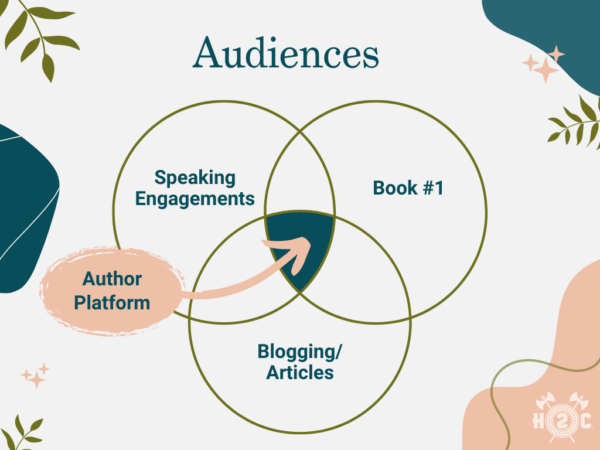Having some form of platform means being visible to your target audience as an expert, thought leader, professional, or influencer.
The concept of an author platform is difficult to explain; everyone seems to describe it differently. Writer and publishing expert Jane Friedman defines it as “an ability to sell books because of who you are or who you can reach.”
The idea of an author platform appeared in the pre-internet 1990s, at a time when nonfiction book proposals were being rejected by agents and publishers because they wanted authors who were in the public eye in some way – writers with credentials and authority.
Your platform – as an author or otherwise – grows out of your body of work. This includes books, articles, blog posts, speaking engagements, and more. Your visibility depends on the communities and professional associations you belong to, your online followers and website traffic, the size of your email newsletter list, etc., but especially how engaged you are with these groups.
An author’s platform is unique, so the process of building it will be different for each person. It’s led by your story/message, your strengths and qualities, and the target audience you’re trying to reach.
Audiences
We talk about audiences a lot when developing marketing plans: Who are the readers this author is trying to reach? Who will benefit from or enjoy this book?
But your platform may have multiple target audiences, depending on everything you have going on. For example, if you’re a professional speaker and an active blogger/article contributor, the audiences you’re trying to reach with those pursuits may be slightly different than the target readers for your book — especially if the topics you’re speaking or blogging about are more broad than the specific focus of your book. If you publish a second book, that may be another audience.
The audience for your author platform then lies at the intersection of all of these.

If you’ve ever wondered why some authors use pseudonyms or pen names, this is one of the reasons. If an author wrote books in vastly different genres — for example, nonfiction business guides versus crime fiction — they may choose to publish under different names to maintain separate author platforms. The audiences for each genre just wouldn’t have enough overlap to warrant lumping them together. If you were following your favorite crime writer on Instagram, you might not care about their next business book, and vice versa.
While engagement on social media helps, it’s not the only kind of impact you should be trying to make.
Developing a platform is generally a slow and organic process, requiring consistent and ongoing effort over the course of a career.
Engagement is Key
You can:
- Belong to associations
- Read major industry magazines, newspapers, blogs, etc.
- Follow influencers and thought leaders
- Know industry experts with existing platforms or leadership roles
But if you’re not putting your voice out there, your audience may still not know who you are. Engaging with this audience can take a variety of forms. We’ll explore ways to engage in future blog posts.
